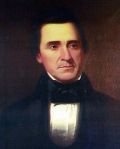On the final day of the second session of the 32nd Congress, Stephen Douglas brought his third attempt to organize the vast Indian country beyond Missouri, Iowa, and Minnesota into a new territory. For eight years railroad rivalries and, increasingly, sectional strife frustrated his ambition to open the land for a Pacific railroad, for white settlement to fill the continent, for profit on his land and railroad investments, and to boost his national prestige with an eye to riding the railroad to the presidency.
Douglas did not have time to kill. He hoped to rush the bill through and had only until midnight. His heart must have sunk when Missouri’s David Rice Atchison rose to speak on the matter. None could doubt his proslavery credentials. He would never stand for more free territory at his doorstep.
But Atchison rose and declared territorial organization inevitable. What happened to the Lower South radical misplaced in a border state? Earlier that very session, he opposed any such organization. Did Bourbon Dave forget his ideology at the late hour?
It was my opinion at that time -and I am not now very clear on that subject- that the law of Congress, when the State of Missouri was admitted into the Union, excluding slavery from the Territory of Louisiana north of 36°30′, would be enforced in that Territory unless it was specially rescinded; and, whether that law was in accordance with the Constitution of the United States or not, it would do its work, and that work would be to preclude slaveholders from going into that Territory. But when I came to look into that question, I found that there was no prospect, no hope of a repeal of the Missouri compromise, excluding slavery from that Territory. Now, sir, I am free to admit that at this moment, at this hour, and for all time to come, I should oppose the organization or the settlement of that Territory unless my constituents and the constituents of the whole South, of the slave States of the Union, could go into it upon the same footing, with equal rights and equal privileges, carrying that species of property with them as other people of this Union. Yes, sir, I acknowledge that that would have governed me, but I have no hope that the restriction will ever be repealed.
Bourbon Dave surrendered, but even in his surrender he kept up Calhoun-style defense of slavery:
I have always been of opinion that the first great error committed in the political history of this country was the ordinance of 1787, rendering the Northwest Territory free territory. The next great error was the Missouri compromise. But they are both irremediable. There is no remedy for them. We must submit to them. I am prepared to do it. it is evident that the Missouri compromise cannot be repealed. So far as that question is concerned, we might as well agree to the admission of this territory now as next year, or five or ten years hence.
If the tide of white settlement must come, let it come:
I know very well that in a very few years, if it is not doing it now, the tide of population, in defiance of this Government, will pass the frontier and take possession of every habitable spot in Nebraska Territory; you cannot keep them out. There is a large portion of our population who are not ready and anxious to abandon their homes to go into this Territory. You cannot restrain them much longer
Given nineteenth century attitudes about progress, and its association with the spread of the white population, that makes a certain amount of sense. Atchison might just not have the stomach to soldier on like an embittered Carolina aristocrat, glaring out at the Senate and nursing ancient grudges. Not everyone imbibed Calhoun’s disposition with his constitutional interpretation.

You must be logged in to post a comment.